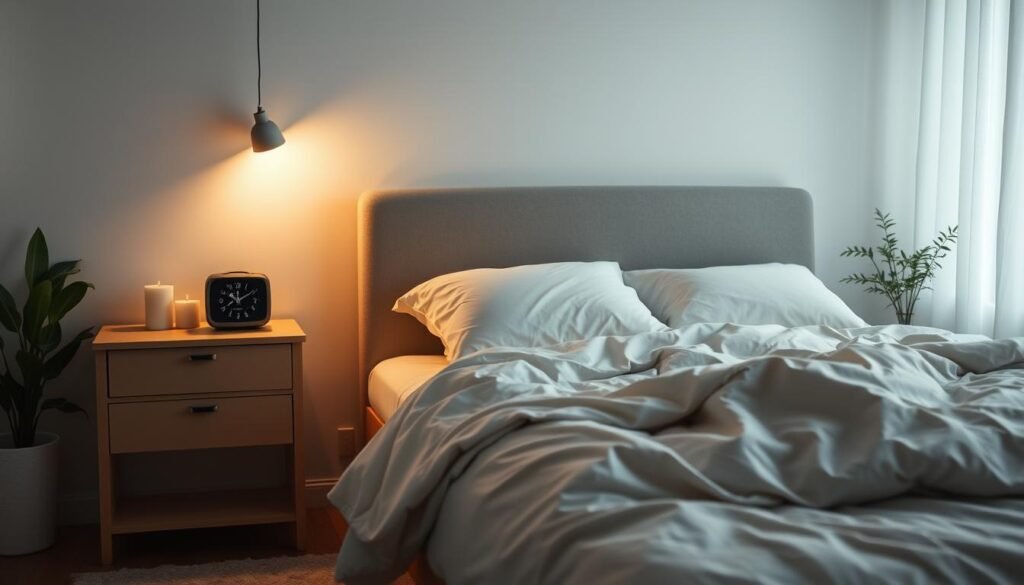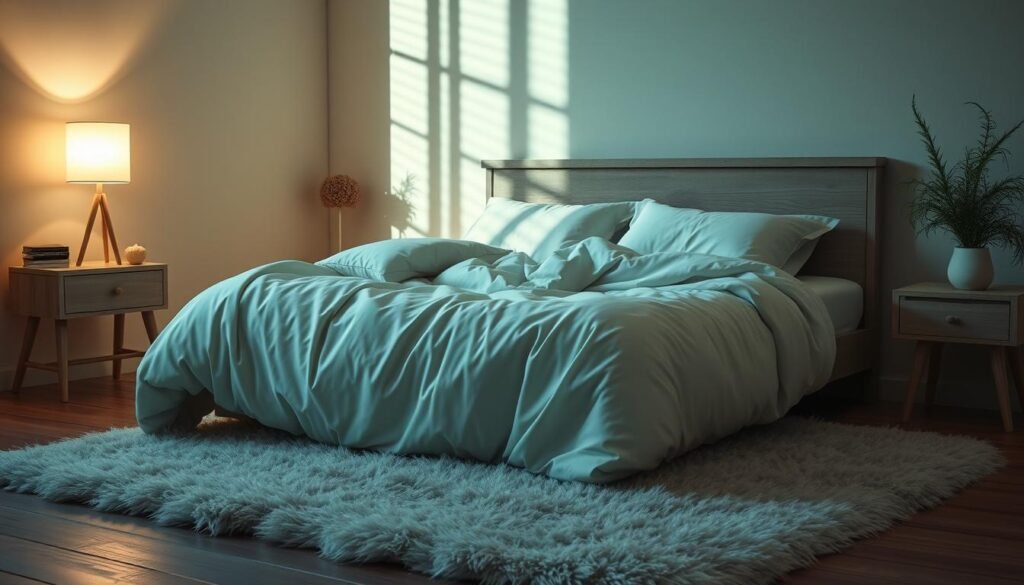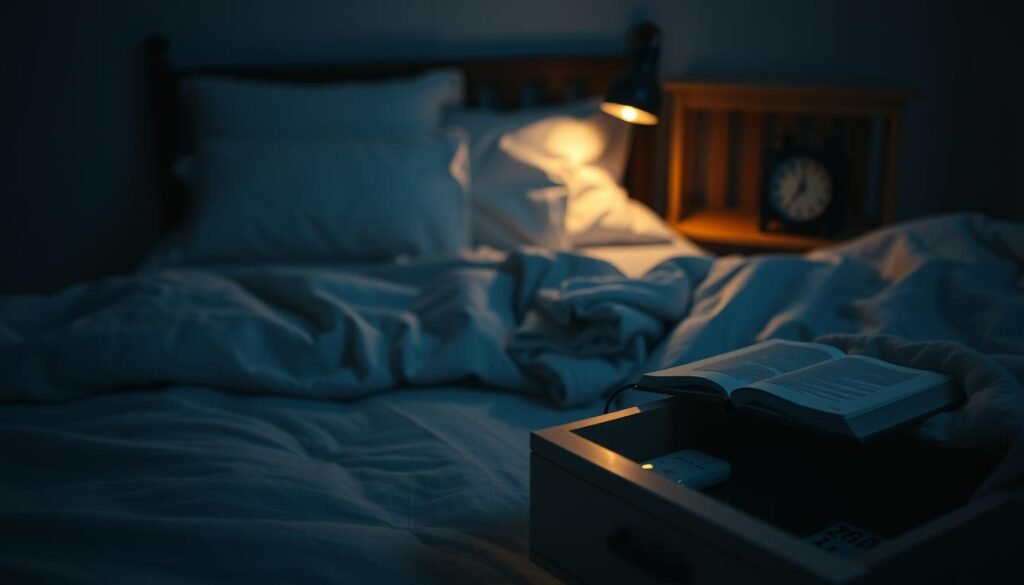A recent Sleepopolis Survey found something interesting. It said that 76 percent of adults who follow a nighttime routine sleep better. This shows how important a calming bedtime routine is. It helps people sleep well at night.
Many people find it hard to sleep. But, having a calming routine before bed can help a lot. It tells your body it’s time to rest. Doing things like relaxing before bed, not using your phone or computer, and sleeping at the same time every day can make your sleep better. This not only makes you feel better but is good for your health too.
Key Takeaways
- A consistent bedtime routine is essential for high-quality sleep.
- Relaxation activities such as meditation can enhance sleep quality.
- Limiting electronic devices before sleep is crucial for melatonin production.
- Setting a regular sleep schedule trains the body’s circadian rhythm.
- Warm baths before bed can improve sleep duration and quality.
- Healthy bedtime practices can impact mental and physical health positively.
Understanding the Importance of a Bedtime Routine
Having a bedtime routine is key for adults to get better sleep. It helps just like it does for kids. By doing the same things before bed, our bodies know it’s time to relax. This makes it easier to fall asleep and have a peaceful night.
Why Bedtime Routines Matter for Adults
Many adults have trouble sleeping. This can make you tired the next day. It can also harm your heart and mental health. A regular sleep routine can help avoid these problems. Sticking to a schedule helps you sleep better. This allows for deeper sleep and vivid dreams by easing stress before bedtime.
Impact on Mental and Physical Health
Good sleep routines are important for more than just sleep. They keep anxiety and depression at bay, improving both mental and physical health. Activities like reading or taking a warm bath at night promote healthy sleep habits. Writing in a journal or practicing relaxation exercises can also calm the mind. This helps with functioning better each day. When you follow your evening routine, good sleep follows.
For more insights on developing effective bedtime routines for adults, visit here.
| Benefits of Bedtime Routines | Effects on Sleep Quality |
|---|---|
| Reduces daytime fatigue | Improves overall alertness |
| Promotes better cardiovascular health | Enhances restorative sleep cycles |
| Decreases anxiety and depression symptoms | Facilitates quicker sleep onset |
| Improves daily functioning | Lowers risk of sleep disorders |
Creating a Schedule for Sleep Consistency
A good routine is key to better sleep. A clear schedule helps your brain know when it’s time to relax. Going to bed at the same time every night makes falling asleep easier and sleep more refreshing.
Setting a Regular Bedtime
It’s important to stick to a fixed bedtime and wake-up time, even on weekends. This keeps your body’s clock in check. Adding calm activities to your evening tells your brain it’s time to wind down. This leads to better sleep over time.
How Consistency Affects Your Sleep Quality
Sticking to a regular sleep time helps your body expect sleep, leading to deeper rest. If your sleep pattern is off, you feel tired and slow. Keeping a good sleep routine can lower your chances of insomnia and boost your mood and alertness. For more help, check out additional resources.

Calming Bedtime Practices: Activities to Prepare for Sleep
It’s key to have calming bedtime habits for better sleep. Doing relaxing things before bed boosts both mind and body health. It’s crucial to have rituals that help the body and mind get ready for rest.
Incorporating Relaxation Techniques
Using different relaxation methods can make sleep better. Deep breaths, like diaphragmatic breathing or the 4-7-8 technique, relax the nervous system. Gentle yoga or stretches relieve the day’s tension. Studies show a regular bedtime routine eases insomnia.
Adding meditation to your nightly routine lowers anxiety, helping you sleep better.
Suggestions for Soothing Bedtime Activities
Calming activities set the stage for good sleep. Listening to soft music or nature sounds makes it easier to sleep. Reading something uplifting distracts from stress. Give yourself 30 to 60 minutes for these practices to signal your body it’s time to rest.

Consider a warm bath to relax and cool down your body temperature. Drinking herbal tea like chamomile or lavender helps you relax. Emphasizing relaxation and calming activities creates a peaceful bedtime environment for better sleep.
For tips on relaxation exercises for sleep, visit this resource.
Limiting Electronics Before Bedtime
A good nighttime routine means less electronics before bed. Today, about 75% of kids and 70% of adults use gadgets in their bedrooms. The glow from TVs, phones, tablets, and game systems impacts our sleep. This light stops melatonin production, making our brains think it’s time to be awake.
The blue light from devices hurts our sleep cycle. It makes us go to bed later and sleep less. A 2016 study found the average home has five electronics, with some having over ten. We must understand how they affect sleep. There are ways to fight blue light, like glasses that block it and device settings that reduce light at night.
Understanding the Effects of Blue Light
Blue light from screens messes with our sleep. It leads to later bedtimes and shorter sleep. A 2016 survey shows U.S. homes are filled with electronics, often more than ten. Knowing how tech impacts sleep is key. Solutions exist, like blue light blocking glasses and night mode settings on devices.
Alternative Activities to Replace Screen Time
Choosing other activities can help sleep better. Doing things without screens helps our brains get ready for bed. Here are some options:
- Reading a book or magazine to relax.
- Trying relaxation methods like deep breathing or meditation.
- Listening to calm music or nature sounds.
- Writing in a journal or thinking about your day before bed.
Turn off gadgets an hour before bed to avoid screens. Tools that automatically turn off devices or set them to airplane mode are helpful. Less screen time at night means better sleep and a more peaceful rest.

Calming Snacks and Beverages for Better Sleep
Eating light snacks and drinks for better sleep is a great idea. Before bed, light foods help you relax without feeling too full. Adding certain foods and drinks to your evening can improve your sleep.
What to Eat for Optimal Sleep Quality
Eating foods with tryptophan, magnesium, and melatonin is helpful. You might try:
- Bananas with low-fat yogurt
- Nut butter on whole-grain crackers
- Tart cherry juice
These snacks can help you sleep deeper. Eating meals that are high in fiber and low in fat helps too. A banana-almond smoothie is a tasty choice that may help with insomnia symptoms.
Herbal Teas and Their Calming Effects
Herbal teas are great for better sleep. Chamomile tea is famous for its calming effects. It’s so popular that a million cups are made every day.
Drinking chamomile tea can reduce anxiety and help you relax. Warm milk is another good choice. It has tryptophan which helps make you sleepy. Teas like peppermint, lavender, and valerian root are also soothing. They help you sleep better.
Adding these snacks and drinks to your night routine is a nice way to sleep better. You can find more advice on sleep-friendly foods and drinks from trusted sources. Check out Sleep Foundation for more information.
The Role of Bathing and Temperature in Sleep Preparation
To sleep well, make your environment right by adjusting the bath and room temperature. Adding warm baths to your nighttime routine can make you relax more. They help soothe your body, making it easier to sleep peacefully.
How Warm Baths Help Relax the Body
Studies show that warm baths or showers before bed can enhance sleep. They do this by cooling down your body afterward, which helps produce sleep-inducing melatonin. Not only do they help you fall asleep faster, but setting a regular bathing schedule improves overall sleep quality.
- Consider activities like relaxing music or reading to help wind down even more.
- It’s also wise to skip caffeine and alcohol before bed to avoid sleep interruptions.
Setting the Ideal Bedroom Temperature
Getting the bedroom temperature right is crucial for good sleep. A cooler bedroom, set between 60 to 67 degrees Fahrenheit, is best. Lowering lights and reducing noise further help create a calm sleeping environment.
| Temperature Range (°F) | Sleep Quality Benefits | Ideal Activities |
|---|---|---|
| 60-67 | Promotes deeper sleep and lowers blood pressure in older adults. | Warm baths, reading, relaxing music |
| Above 70 | May lead to restlessness and disturbed sleep. | Avoid activities that increase stress or arousal. |
Mindfulness Exercises and Sleep Meditation
Adding mindfulness exercises and sleep meditation to your nighttime routine can improve your sleep. These methods ease the mind and body, which is vital since about 30% of people in the U.S. don’t get enough sleep. Mindfulness creates mental clarity, helping you relax and get ready for a good night’s sleep.
Techniques for Effective Sleep Meditation
There are many ways to practice sleep meditation. Some popular methods are:
- Visualization: Picture a calm place to steer your mind away from worries.
- Deep Breathing: Mastering deep breaths starts a relaxation response, crucial for calming down.
- Guided Meditations: Listening to well-known people like Jason Stephenson or Deepak Chopra can deepen relaxation.
- Belly Breathing: A simple technique that promotes ease and fosters a peaceful state of mind.
The Benefits of Mindfulness Before Sleep
Doing mindfulness exercises before bed has many advantages. These practices are as beneficial as other top insomnia cures. They lower stress, anxiety, and depression, which can interfere with sleep. Being regular with these exercises helps achieve a calmer mindset and better sleep quality.
Studies show mindfulness meditation can address issues for the nearly 43% of Americans who stay awake at night due to stress.
Journaling and To-Do Lists for a Calmer Mind
Adding journaling and to-do lists to your nightly routine can make your mind calmer. These activities are great tools for relaxing before bed. They help individuals wind down and get ready for deep sleep.
Using Journaling as a Tool for Relaxation
Journaling at night has many benefits, like easing anxiety and negative thoughts. It helps clear your mind by arranging your thoughts and feelings. This can be super helpful for people who struggle to calm down at night.
Evaluating your day can help you accept it and get ready for tomorrow. Writing about worries, successes, and goals can lead to a positive mindset and better sleep. You can write about what you hope to achieve tomorrow, what you accomplished today, and a happy thought. For more tips, check out this guide on using a night journal.
How To-Do Lists Improve Sleep Onset
Writing to-do lists before bed is key to less anxiety over unfinished tasks. These lists make it easier to switch from day to night mode mentally. They also reduce stress about what needs to be done.
Studies show that writing down your goals can increase motivation and focus. This helps you feel more organized and ready for sleep. A well-organized mind leads to better sleep quality.
Conclusion
Setting up calming bedtime routines is key to good sleep. Studies show that not sleeping well affects our daily lives and health. With a regular sleep schedule, you can really improve how well you sleep and feel.
It’s also important to relax before bed. Doing things like turning down the lights and making your room comfy helps your brain get ready for sleep. When you make these things a habit, you’ll see how much better you sleep.
By sticking to these routines, your sleep and mental health will get better. This is really important for those who don’t get enough sleep or have insomnia. Making these changes can lead to a healthier and happier life.